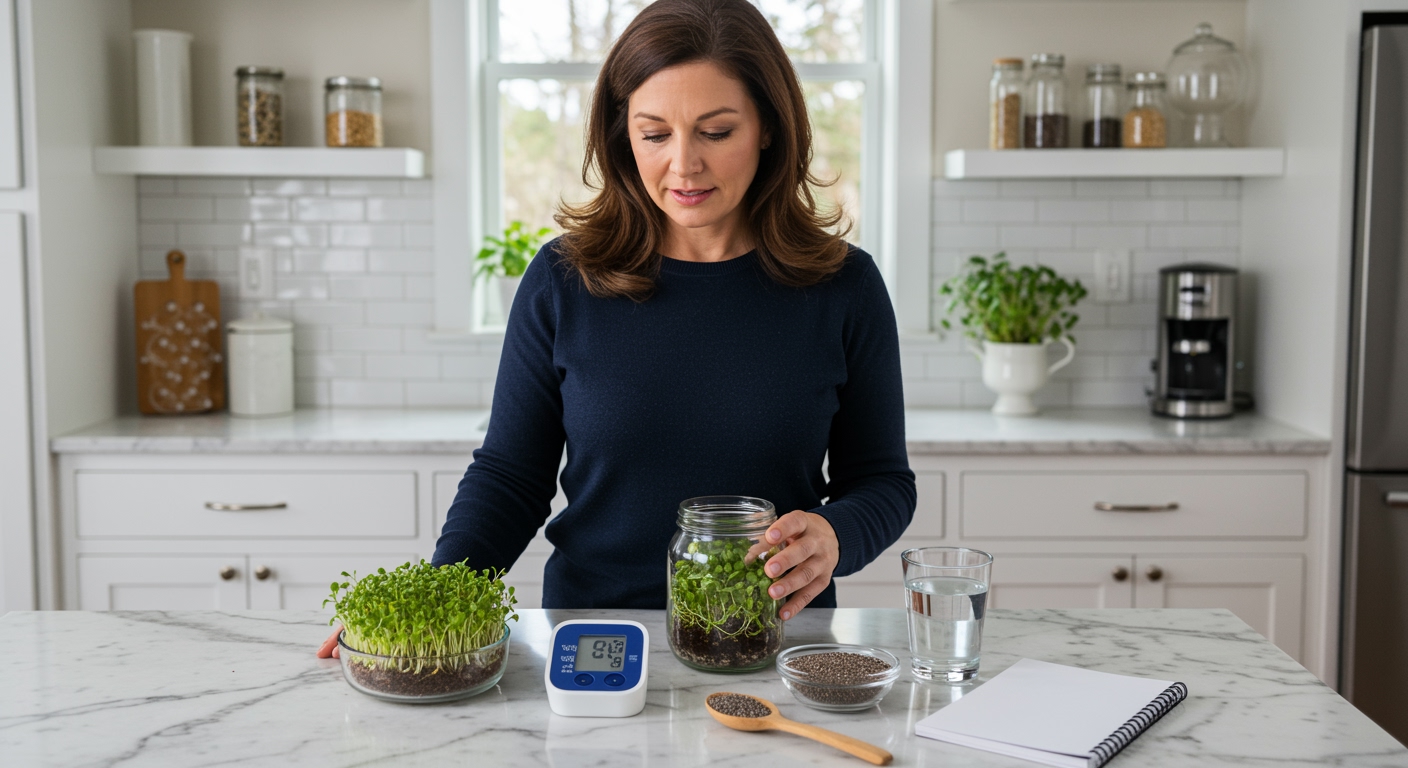✪ Key Takeaway: Chia sprouts may lower blood pressure further due to concentrated nutrients, requiring careful monitoring for hypotensive individuals.
Introduction
Your friend just told you about amazing chia sprouts and their incredible health benefits.
But you already struggle with low blood pressure and wonder if these tiny green powerhouses could make your condition worse.
Hi, I’m Abdur, your nutrition coach and today I’m going to explain exactly how chia sprouts affect blood pressure and whether they pose risks for people with hypotension.
What Makes Chia Sprouts Different From Regular Seeds?
Chia sprouts contain concentrated nutrients that develop during the sprouting process.
When chia seeds sprout, they activate enzymes that break down stored nutrients into more bioavailable forms.
This process increases vitamin C content by up to 600% and boosts antioxidant levels significantly.
The sprouting also reduces antinutrients like phytic acid, allowing your body to absorb more minerals like potassium and magnesium.
These minerals play crucial roles in blood vessel relaxation and heart rhythm regulation.
✪ Fact: Sprouted seeds can contain up to 30% more nutrients than their unsprouted counterparts.
How Do Chia Sprouts Affect Blood Pressure?
Chia sprouts contain high levels of omega-3 fatty acids that promote blood vessel flexibility.
These healthy fats help reduce inflammation in arterial walls, making them more elastic and responsive to blood flow changes.
The concentrated potassium content in sprouts works as a natural vasodilator, causing blood vessels to widen.
Magnesium in chia sprouts acts as a calcium channel blocker, preventing excessive muscle contraction in arterial walls.
Research shows that regular consumption of sprouted seeds can reduce systolic blood pressure by 3-5 mmHg in healthy individuals.
For people with already low blood pressure, this reduction could push readings into the hypotensive range below 90/60 mmHg.
✪ Pro Tip: Monitor your blood pressure for two weeks when introducing any new sprouted foods to your diet.
What Are The Warning Signs Of Worsening Low Blood Pressure?
Dizziness when standing up quickly becomes more frequent and severe with dropping blood pressure.
You might experience increased fatigue throughout the day, even after adequate sleep.
Blurred vision and difficulty concentrating can signal that your brain is not receiving enough oxygenated blood.
Cold hands and feet occur because your body prioritizes blood flow to vital organs over extremities.
Nausea and lightheadedness during normal activities indicate your cardiovascular system is struggling to maintain adequate circulation.
If you notice these symptoms after adding chia sprouts to your diet, reduce or eliminate them immediately.
✪ Note: Severe hypotension can lead to shock and organ damage if left untreated.
Can You Safely Include Chia Sprouts With Low Blood Pressure?
Start with tiny amounts, no more than one teaspoon of chia sprouts per day initially.
Monitor your blood pressure readings twice daily for the first week to track any changes.
Consume chia sprouts with meals rather than on an empty stomach to slow nutrient absorption.
Increase your salt intake slightly on days when you eat sprouts to help maintain blood volume.
Stay well hydrated by drinking at least 8 glasses of water daily to support healthy circulation.
Consider eating chia sprouts only 2-3 times per week rather than daily to minimize cumulative effects.
Always consult your healthcare provider before adding sprouted foods if you take blood pressure medications.
✪ Pro Tip: Keep a food and symptom diary to identify patterns between chia sprout consumption and blood pressure changes.
The Bottom Line
Chia sprouts can indeed worsen low blood pressure due to their concentrated nutrients that promote blood vessel relaxation and improved circulation.
Your health is not worth risking for any superfood, no matter how nutritious it claims to be.
I would love to hear about your experiences with chia sprouts or any questions you have about managing low blood pressure naturally in the comments below.
References
At NutritionCrown, we use quality and credible sources to ensure our content is accurate and trustworthy. Below are the sources referenced in creating this article:
- Healthline: Chia Seeds Lower Blood Pressure
- PMC: Chia Seeds and Cardiovascular Health
- Harvard Health: Chia Seed Benefits What You Need to Know
- Healthline: Chia Seeds Side Effects





